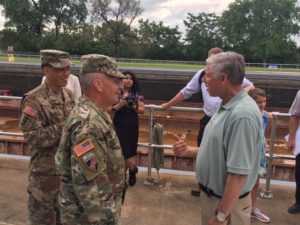
The Army Corps briefs the congressional delegation on its plan to deter the Asian carp invasion. “All the pieces are in place,” says Sen. Stabenow.
Michigan’s congressional delegation hit the road this week to call for quick U.S. Army Corps of Engineers and congressional action to stop Asian carp at a choke point 41 miles from Lake Michigan.
The 11-member delegation traveled to the Brandon Road Lock near Joliet, Illinois, for a tour of the site and a briefing conducted by the Army Corps’ top officer, Lt. Gen. Todd Semonite, and his staff.
In May, Semonite sent his approval to Congress for the $778 million plan that now faces congressional scrutiny and consideration for funding.
“This is one of the most important projects for the Corps of Engineers,” Semonite told Great Lakes Now.
Semonite said the Army Corps “works on science and engineering” and doesn’t have other agendas.
“If we can’t figure out a solution that balances the variables of navigation and protection of the Great Lakes from Asian carp, we’re going to have a challenge.”
Semonite said he will tell Congress the Brandon Road project “needs to get done” but reiterated that Congress will ultimately decide if the project goes forward.
Showing unified support
As Michigan has the most to lose should Asian carp become established in the Great Lakes, part of the delegation’s mission was to show unified support for the project.

U.S. Representative Brenda Lawrence speaking with a member of the U.S. Army Corps of Engineers, Photo by Gary Wilson
Stopping Asian carp and “maintaining the Great Lakes ecological system rests in the hands of the Michigan delegation,” Rep. Brenda Lawrence from Michigan’s 14th congressional district said.
Lawrence included Illinois and Indiana among the states that need to lead on the carp issue.
Lawrence, a Democrat, is on the House appropriations committee that must approve funding for the project. She said she’s been making the funding case with her colleagues from outside the Great Lakes region who may be skeptical about paying for a regional project.
On collaboration with Republicans, Lawrence said she “disagrees with Republicans on so many things but if you want to get the delegation together, start talking about the Great Lakes. The lakes unite us regardless of party.”

U.S. Representative Fred Upton speaking with a member of the U.S. Army Corps of Engineers, Photo by Gary Wilson
During the tour of the lock, Army Corps representatives faced questions about the suite of options that will be used to deter the carp and the cost of the project that has mushroomed from an initial estimate of $275 million to an estimate of $778 million.
The technical deterrents include additional electric barriers, a noise blaster, bubble curtains and a flushing lock that would dispose of floating carp. The cost of the project could vary by as much as 60 percent as it is still in the design and engineering phase.
Semonite said he addressed concerns about the effectiveness of the plan in a closed meeting and said, from an engineering perspective, there are still some potentially costly unresolved issues.
Stabenow onboard, Kildee has concerns
Following the closed briefing, Sen. Debbie Stabenow expressed confidence in the Army Corps and its plan.
“I feel very confident that we have the Corps’ support and that we have bipartisan support both in Michigan and Illinois,” including the governors of the two states, Stabenow said. “We’re really at a point here where all the pieces are in place to move as quickly as possible.”
But Flint Rep. Dan Kildee still has concerns about the effectiveness of the project. He said his questions were not answered to his satisfaction and skepticism is warranted.
“I have some real concerns about using technology that’s not been used anywhere else to try to deal with a threat that’s an existential threat to our way of life,” Kildee said. He’ll continue to raise questions until he’s satisfied everything is being done to protect the Great Lakes, he told Great Lakes Now.
Asked if the Army Corps is sufficiently behind the project, Kildee said he’s more concerned about “the (Trump) administration the Corps is responsible to.” He cited the effort it took to secure the release of the final Chief’s Report from the Corps.
“This administration was not anxious to move forward and that was very concerning,” Kildee said.
Hurdles remain in Illinois
While new Illinois Gov. J.B. Pritzker has reversed the course of his predecessor, Bruce Rauner, on support for the Brandon Road plan, that support is currently limited to sponsoring pre-construction and engineering work, Pritzker wrote in a letter to the Corps.
Pritzker remains adamant on controlling costs of the project and said in the letter that he “will not sign a Project Partnership Agreement without a cost control strategy.”
Illinois Sen. Dick Durbin was scheduled to attend the briefing with the Michigan lawmakers but canceled because of a personal commitment.
Durbin’s support is key to securing congressional approval and funding for the Army Corps’ plan. He is the No. 2 ranking senate Democrat and is on the appropriations committee that must fund the project.
A meeting of representatives of Great Lakes governors and Canadian premiers to discuss the Army Corps’ carp plan is scheduled for mid-July in Chicago.
If approved and funded, the Brandon Road project is scheduled for completion in 2027.
Featured Image: Greetings from Chicago, Illinois, Image by Boston Public Library via flickr.com cc 2.0







